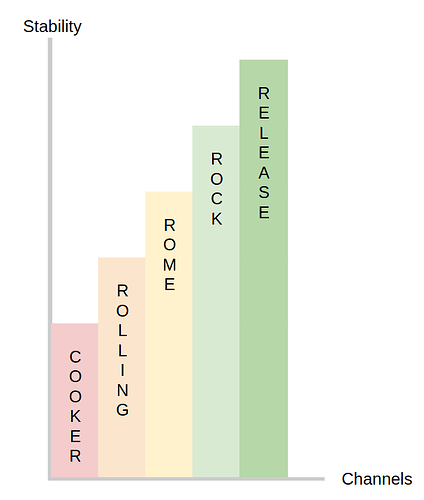I hope this is an explanation and not added confusion:
The terms upgrade and system or distro upgrade or distro-sync or dsync are used as the main package manager dnf uses them. With dnf a numerically greater version of a package is an upgrade or up and a numerically lesser or smaller version of a package is a downgrade.
This: OpenMandriva Release Plan and Repositories is an attempt to explain the various releases and how they relate to repositories.
Release=point releases (as in a point in time) of OMLx such as 4.2, 4.3, 5.0 — user would use the numerical repository for their chosen version. Point releases are EOL (End Of Life) 3 months after latest point release. This does not mean no support it does mean no new packages.
Rock=latest point release version currently 5.0 — Rock normally only gets security and bug fix updates. User would use the repositories called Rock.
ROME=rolling release version — ROME gets periodic upgrades from Cooker as developers believe the packages are ready and stable. User would use the repositories called Rolling.
Cooker=OpenMandriva development platform. — Cooker will have the most recent package versions. Sometimes the work developers do results in things in Cooker being broken. So anyone using Cooker needs to be aware of this and how to deal with this. User would use the repositories called Cooker.
Note: ROME and Rolling are the same. ROME uses rolling repositories.
The work flow in OMLx is:
Cooker>ROME>Rock/latest point release.
So a system upgrade refers basically to system packages. Release and Rock versions have system packages locked and normally they do not change. ROME/rolling does have upgrades to system packages when developers believe it safe to do so. Cooker will have the most recent system packages and sometimes there are things not working quite right or even broken as developers work on these issues.
So one would upgrade thus:
Older point releases should upgrade one step at the time until you get to the latest. Currently that is Rock/5.0
Rock/4.3 to Rock/5.0
Rock/5.0 to ROME
ROME to Cooker
It strongly with prejudice recommended that users do not skip steps in system upgrades doing this one step at the time.
Downgrading is not recommended at all.
Another explanation:
Current OMLx release versions are:
Rock=5.0
ROME=24.01
Cooker=24.90
You can see that 24.01 is greater than 5.0 and 24.90 is greater than 24.01. This is not an accident. Hence up or upgrade.
Personal opinion:
-
The idea that the most stable release version of any Linux distro is the one with the oldest packages is at best an oversimplification and may be false. Things like kernel upgrades and any packages with security upgrades almost always make the system better and more stable.
-
In my own use and based on user reports we in the contributor group see no evidence that ROME would be less stable than Rock. ROME would be more secure because of the upgrades.
-
Cooker would obviously be unstable because it is by design meant to be a place where things can be broken while developers do the work they do. But often Cooker is the best of OpenMandriva because of the newer software. For non-technical users using Cooker would probably be a headache.
-
When considering stability people often seem to miss the security aspects of latest packages. The impact can be considerable. This is why I strongly consider ROME to be a better option for “regular” users of OMLx.
-
Rock IMO is suited for business or server use and for folks that do not like a lot of change.
-
As a QA person and OMLx tester I do have partitions on my laptop of Cooker, ROME, and Rock (all znver1). I regularly use all of them. I also normally have each of these in VirtualBox as x86_64 for testing things.
![]() I might be totally wrong and would be glad to rectify my grammar
I might be totally wrong and would be glad to rectify my grammar ![]()
![]()
